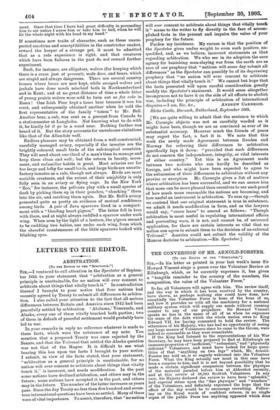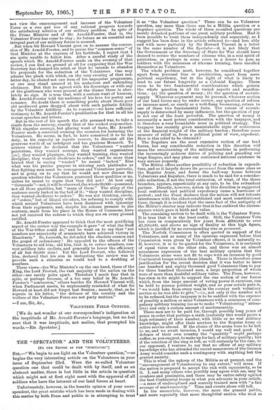[To TILE EDITOR OP THE "SPECTATOR. " ] SIR,—In his letter as
printed in your last week's issue Sir Howard Vincent sings a paean over the Volunteer Review at Edinburgh, which, as he correctly expresses it, has given a " tangible reminder to the country of the numbers, the composition, the value of the Volunteer Force."
So far, all Volunteers will agree with him. The review itself, and the way in which it has been received by the country, have shown, as perhaps nothing else could have done, how essentially the Volunteer Force is bone of the bone of us, and how it provides us with all the machinery for a national military system which will supply our needs without running counter to any of our prejudices. Sir Howard Vincent speaks no less in the name of all of us when he expresses his sense of the debt which the whole nation owes to King Edward VII. for having consented to hold the review. The utterances of his Majesty, who has had no opportunity of seeing any large masses of Volunteers since he came to the throne, were indeed as seasonable as they were remarkable.
If the King had listened to the representations of his War Secretary, he may have been prepared to find at Edinburgh an immense proportion of "inefficient," "redundant," and "physically deficient" Volunteers, and must have looked for large quan- tities of that "anything on two legs" which, Mr. Arnold- Forster has told us, is so eagerly welcomed into the Volunteer Force. What the King actually saw must in this case have been a surprise to him, and it is not beyond possibility that he made a certain significant comparison between the physique of the material paraded before him at Aldershot recently, and at this review of 38,383 Scottish Volunteers. In any case, his Majesty declared the review to have been "splendid," laid especial stress upon the "fine physique" and "numbers" of the Volunteers, and definitely expressed the hope that the effect of the day would be to encourage recruiting. Follow- ing on the Royal words of confident esteem, in no single organ of the public Press has anything appeared which does
not view . the encouragement and increase of the Volunteer Force as a sine qua non of any rational progress towards the satisfactory solution of our military problem. In spite of the Prime Minister and of Mr. Aruold-Forster, that is, the Volunteer Force has come to stay ; its future as an essential and integral part of our military forces is assured. ,But when Sir Howard Vincent goes on to assume the conver- sion of Mr. Arnold-Forster, and to praise the "common-sense" of that Minister at the expense of his fortitude, I regret that I am " quite unable to follow him. After a careful study of the speech which Mr. Arnold-Forster. made on the evening of that review, I can find no ground at all for supposing that the War Secretary has changed his mind, or that he intends to abandon his proposals for the reduction of the Volunteers. One may admire the pluck with which, on the very evening of that red- letter day, he abated not one item of his unpopular programme, or one may stand amazed at his audacious and unbending obstinacy. But that he agreed with his Sovereign or with any of the gentlemen who were present at the dinner there is abso- lutely no sign. It is true that, with a certain want of humour, Mr. Arnold-Forster told his audience of his love for poetry and romance. No doubt there is something poetic about those poor old mediaeval guns dragged about with such pathetic fidelity by the Volunteer Artillery. As to romance—we have sufficient testimony to Mr. Arnold-Forster's predilection for that in all his recent speeches and letters.
But in the rest of his speech the role assumed was, to take a simile from the nursery, exactly that of the wicked step-mother. With singular courage, but glaring want of taste, Mr. Arnold- Forster made a convivial evening the occasion for lecturing the Volunteers. Ho seems, in fact, to have conceived it to bo his duty, in his capacity as injusta norerca, to discount all the generous words of an indulgent and too gracious Monarch. To achieve victory ho declared that the Volunteers " wanted patriotism, they wanted courage, they wanted organisation [sic], they wanted physique, they wanted training, they wanted discipline, they wanted obedience to orders," and he more than hinted that in saying " wanted " he meant "lacked." Else what was his precise purpose in uttering such platitudes as that fighting men must be courageous and Volunteers -patriotic, and in going on to say that he would not now discuss the question whether the Volunteers possessed those qualities or no, unless he meant to argue that they did not ? At best only " thousands"—not, it will be observed, the whole 38,000—possessed, not all these qualities, but "many of them." The sting of the sentence surely lurked in the tail of it: "they wanted discipline, they wanted obedience to orders." Ho was not thinking, surely, of "orders," but of illegal circulars, for refusing to comply with which several Volunteers have been dismissed with ignominy from their regiments, and, despite his solemn promise to the contrary, made from his place in the House of Commons, have not yet received the redress to which they are on every ground entitled.
Mr. Arnold-Forster appeared to think that the"most gratifying aspect of the review was the example it gave " of what the Staff of the War Office could do," and he went on to say that " not numbers nor superiority of armaments have achieved victory in Manchuria." So, forsooth, he defended the obsolete cannon and the gospel of redundancy ! He appealed to the officers of the Volunteers to aid him ; aid him, that is, to reduce numbers, con- vert artillery into cyclists, and generally to lower the efficiency of all but 60,000 men ! Yet the Lord Provost, who followed him, declared that his aim in instigating the review was to provide such a stimulus as would lead to a doubling of numbers.
These views—the War Minister's on the one hand, those of the King, the Lord Provost, the vast majority of the nation on the other—are surely poles apart. Therefore I much fear that in spite, or perhaps because, of a too easy belief in Mr. Arnold- Forster's " conversion " others besides Sir Howard Vincent will, when Parliament meets, be unpleasantly reminded of what Sir Howard at least did not forget last Session ; namely, that, as he repeats in his letter, " the defence of the country and the welfare of the Volunteer Force are not party matters."
—I am, Sir, &c., VOLUNTEER FIELD OFFICER.
[We do not wonder at our correspondent's indignation at the ineptitude of Mr. Arnold-Forster's language, but we feel sure that it was ineptitude, not malice, that prompted his words.—ED. Spectator.]











































 Previous page
Previous page